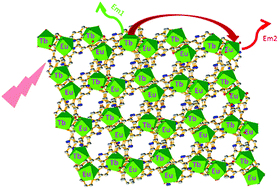A family of mixed-lanthanide metal–organic framework thermometers in a wide temperature range†
Abstract
By choosing 2-pyridin-4-yl-4,5-imidazoledicarboxylic acid (H3PIDC) as the first ligand and sodium oxalate (OX) as the ancillary ligand, a series of mixed-lanthanide metal–organic frameworks (M′LnMOFs) [Tb1−xEux(HPIDC)(ox)1/2H2O]·3H2O (x = 0 1, 0.01 2a, 0.03 2b, 0.05 2c, 0.08 2d, 0.1 2e, 0.3 2f, 0.5 2g, 1 3) have been successfully synthesized via hydrothermal reactions. 2a–2f can serve as ratiometric luminescent sensors for detecting temperature. In this co-doped system, 2d shows an excellent linear response relationship with temperature from 303 to 473 K and exhibits a maximum relative sensitivity (Sr) of 0.60% K−1 at 473 K. Furthermore, powder X-ray diffraction (PXRD) experiments indicate that 2d has excellent chemical stability under simulated physiological conditions and alkali-acid solutions with pH ranging from 4 to 11, which makes it suitable to be applied in the physiological environment.



 Please wait while we load your content...
Please wait while we load your content...